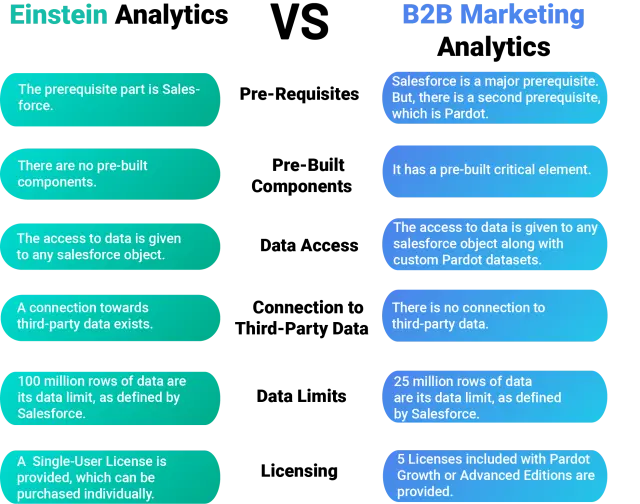Einstein Analytics vs B2B Marketing Analytics: What’s the Difference?
Table of Contents
Analytics is termed as a scientific process wherein discovery and communication of meaningful patterns is done, which can further be found in data. Furthermore, analytics are concentrated on turning raw data into better insight to make good decisions. It trusts the working of various applications, such as statistics, computer programming, and operations research, to quantify and gain insights into the data. It is specifically helpful in areas that record and work over massive amounts of data or information. In this blog, we will be discussing two such superior and popularly used Analytics platforms on Salesforce. These two highly efficient analytics platforms are- Einstein Analytics and B2B Marketing Analytics. With their superior functions, both these platforms provide the best analytics solutions to the same businesses.
Before moving forward with the points that make them different, let’s discuss their basic definition.
Salesforce Einstein Analytics is a well-known product of Salesforce and also a cloud-based platform. It can be termed a rebranded analytics tool, formerly known as the ‘Wave Analytics’. Salesforce Einstein Analytics Implementation can help businesses in data exploration, visualization, and getting better insights into the businesses. While being the native application of Salesforce, Einstein Analytics is secured and scalable to meet the rapidly changing business requirements in the modern world. One can also add more functionalities to analytics through AppExchange.
Salesforce B2B Marketing Analytics is an Einstein Analytics application mainly built for the B2B marketer. While there is the utilization of the same powerful functionality, B2B Marketing Analytics further brings the data from Pardot and Salesforce. This is done to provide several custom dashboards that also work towards scrutinizing the success in the growth of both marketing and promotional efforts. Furthermore, B2B Marketing Analytics is available for the Pardot clients who have the Growth or Advanced editions.
Difference Between Einstein Analytics vs B2B Marketing Analytics


The main points of difference between Einstein Analytics and B2B Marketing Analytics are as follows:
Pre-Requisites:
By Pre-Requisite, we mean anything that must be acquired or accomplished first, in order to move on with something else.
In the case of Einstein Analytics, the prerequisite part is Salesforce. For any business to move forward with Einstein Analytics, integration and knowledge of Salesforce are the most essential thing before moving ahead with it.
In the case of B2B Marketing Analytics, as it includes Einstein Analytics, Salesforce is considered a major prerequisite. But, there is a second prerequisite as well here, which is Pardot. Pardot is a software as a service (SaaS) marketing automation platform which further offers email automation, targets email campaigns, and leading management for the B2B sales and marketing businesses.
Pre-Built Components:
By Pre-Built Components, we mean the already established components before the final software is provided to the user. In Einstein Analytics, there are no pre-built components that are important to be mentioned as such, B2B marketing analytics has a pre-built critical element. B2B Marketing Analytics comes with six pre-built dashboards. It enables dashboards that work based on the datasets and is one of the three essential components. These dashboards further give acceptance to visualize the given information from different perspectives to the marketer.
Data Access:
With Einstein Analytics, you can grow your business exponentially. The access to data in the case of Einstein Analytics is given to any salesforce object. Salesforce objects are termed as database tables that provide access to store the data specific to any organization.
Whereas the access to data in the case of B2B Marketing Analytics is given to any salesforce object along with custom pardot datasets. Pardot datasets are one of B2B Marketing Analytics’ three main components and capture the data about one’s automated marketing efforts. They majorly deal with the different kinds of automated assets that one has created and also the metrics about how the prospects must be dealt with.
Connection to Third-Party Data:
Third-party data is termed as any information that is collected by any entity. Further, does not have any direct relationship with the user and the data that is being collected. Often, third-party data is accumulated from various websites and platforms and is further gathered together by a third-party data provider.
In the case of Einstein Analytics, a connection towards third-party data exists. While in the case of B2B Marketing Analytics, there is no connection to third-party data.
Data Limits:
Data Limit or Data Cap is the maximum amount of data allowed to a particular organization based on the limit as provided by the software.
Talking about Einstein Analytics, 100 million rows of data are its data limit, as defined by Salesforce. Users or organizations that require more than the given data limit have to upgrade their data plan by incurring further costs.
Whereas, in the case of B2B Marketing Analytics, 25 million rows of data are its data limit, as defined by Salesforce. This is less as compared to the data limit provided by Einstein Analytics.
Licensing:
Licensing is a term given to any business arrangement wherein one company provides another company with a permit to manufacture its product for a specified payment.
In the case of Einstein Analytics, a Single-User License is provided, which can be purchased individually. Whereas, in the case of B2B Marketing Analytics, 5 Licenses included with Pardot Growth or Advanced Editions are provided.
Conclusion
The main aim of Analytics is to make it easy to accumulate the Salesforce data or any other data from one’s business. Moreover, one can instantly explore the information provided and find the insights, and take actions that help the whole team move forward.
Both Einstein Analytics and B2B Marketing Analytics are important tools for analytics in Salesforce. While keeping the differences mentioned above in mind, it can be concluded that B2B Marketing Analytics would be the best choice if one’s business requires an analytical platform to be more easily engaged with its customers across multiple channels and further assist in their respective customer journey.
Don’t Worry, We Got You Covered!
Get The Expert curated eGuide straight to your inbox and get going with the Salesforce Excellence.










